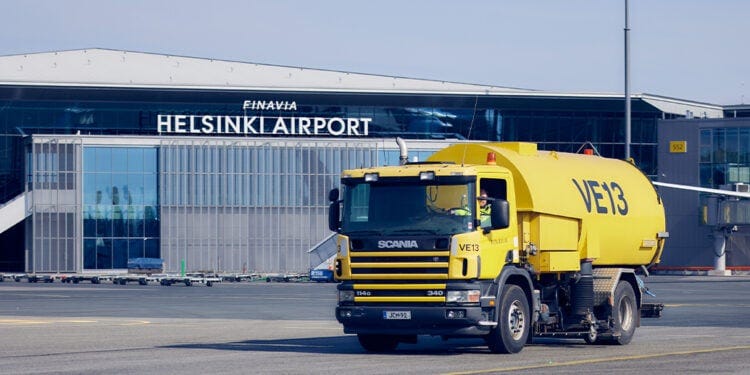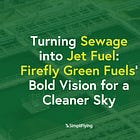#Sustainability20: Elysian, KLM and Transavia join forces for the future of electric aviation & more
Weekly Roundup - 13/06/25
Each Friday, we publish a round-up of the 20 most important stories on sustainable aviation. You can see previous editions of #Sustainability20 here.
Industry updates
The IATA reports global SAF production will reach 2 million tonnes this year but warns it’s less than 1% of airlines’ needs. Europe’s mandates have doubled costs, prompting calls for better policies.
Rolls-Royce’s CEO has abandoned electric flying taxis, citing soaring costs and delays. The projected £1 million per unit rose to £3 million, making mass production unviable for now.
The EU will subsidise over 200 million litres of SAF to encourage airlines to switch from kerosene. The scheme aims to cover 15% of global SAF demand but faces cost challenges.
The first ICAO Aviation Climate Week concluded with progress on SAF and clean energy. Over 500 delegates discussed decarbonisation strategies ahead of September’s Assembly, including a new finance platform for green projects.
Air New Zealand remains committed to sustainability despite dropping its 2030 SBTi target. It aims for a 20-25% emissions cut by 2030 and is testing electric aircraft with BETA Technologies.
CLIMATE WATCH: Europe and China in midst of record-breaking heat - The Guardian
Europe and China face record-breaking June heatwaves, with temperatures exceeding 40°C in Portugal and Spain. Xinjiang hit 47.1°C, while Canada battles wildfires forcing Indigenous evacuations.
Infrastructure and operational efficiencies
Helsinki Airport has achieved net-zero carbon emissions, aided by Neste’s renewable diesel. Finavia aims for all its airports to reach net zero by 2025, with five already certified.
San Diego Airport has launched a hydrant fuelling system to cut emissions and boost efficiency. The underground pipeline reduces fuel truck reliance, speeding up operations while lowering environmental impact.
Dubai Airports is replacing 330,000 lights with energy-efficient LEDs across its terminals, saving 47 million kWh yearly. The retrofit, with Etihad ESCO, supports the UAE’s 2050 net-zero strategy.
Sustainable Aviation Fuel (SAF)
Firefly Green Fuels has secured investment from Builders Vision to scale its sewage-to-SAF technology. The UK firm plans its first plant by 2028, backed by an offtake deal with Wizz Air.
SkyNRG forecasts global SAF supply will hit 18.1 million tonnes by 2035 but warns demand will outstrip it by 23 million tonnes. Current production growth lags behind airline decarbonisation targets.
XCF Global’s CEO says private investment in SAF remains strong despite US policy shifts. While IRA credits boosted projects, market volatility has slowed financing, though long-term demand is secure.
Honeywell, Samsung E&A, Johnson Matthey, and Gidara Energy have partnered to streamline SAF production from waste. The alliance aims to cut costs and timelines, targeting global aviation’s decarbonisation goals.
Syzygy Plasmonics has begun FEED work on NovaSAF 1, a biogas-to-SAF plant in Uruguay. The facility, using cow manure, aims for 2027 operations and an 80% lower carbon intensity than Jet-A.
New technology: Electric and Hydrogen
Elysian, KLM, and Transavia are collaborating on electric aviation, with a focus on the 90-seat E9X aircraft. Workshops will explore operational and commercial viability, aiming for emission-free regional flights.
A consortium including Airbus and Air Products plans a Dutch hydrogen hub for aviation. The project will test liquid hydrogen infrastructure at Rotterdam and Schiphol airports to support zero-emission flights.
Blue Spirit Aero has unveiled its hydrogen-electric Dragonfly aircraft, completing taxi and refuelling tests. The four-seater, targeting 2027 certification, features 12 fuel-cell-powered motors and ultra-low noise.
Eve Air Mobility advances eVTOL testing, prioritising ground validation before summer flights. Design updates include wheeled landing gear and an optimised cabin, with certification targeted for 2026-27.
Vertical Aerospace and Bristow expand their eVTOL partnership, offering a ‘ready-to-fly’ model for operators. Bristow pre-ordered 50 VX4 aircraft, with plans to manage fleet operations globally.
Turbotech used Ansys simulation to develop a hydrogen-fueled turbine engine, cutting prototyping costs. The BeautHyFuel project aims to decarbonise light aviation with retrofit-ready, fuel-agnostic technology.
Collins Aerospace has opened new facilities in the UK and France for electric aircraft systems. Its elecTRAS technology cuts weight by 20%, improving fuel efficiency for planes like the Airbus A350.








